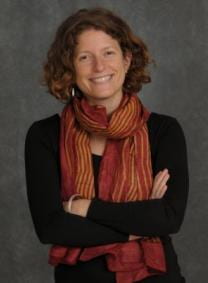Michele Friedner, Associate Professor and Director of Graduate Studies for the Department of Comparative Human Development and COSAS Member has been awarded the prestigious 4S Rachel Carson Award for her book Sensory Futures: Deafness and Cochlear Implant Infrastructures in India (University of Minnesota Press 2022).
The award is presented to one book annually by the Carson Committee of the Society for Social Studies of Science. “The award committee received 21 books for consideration and shortlisted 6 works for this year’s prize, evaluating them for their overall scholarly qualities and their contributions to opening new avenues for public debate and social change. The committee unanimously found Sensory Futures: Deafness and Cochlear Implant Infrastructures in India to be exemplary in all these criteria,” they said. “Sensory Futures provides a careful and critical analysis of key issues within disability studies that contributes to theory and methodology in Science and Technology Studies (STS), anthropology, and the social sciences more generally.”
Friedner gave the following acceptance statement: “What an honor to receive the 2024 Rachel Carson Prize! As I often tell people, I did not intend, or even want, to write a book about cochlear implantation in India. My first book was based on research with Indian Sign Language speakers who wanted more Indian Sign Language speakers, and more deaf people, in the world. However, when I returned to India in 2016, I started learning about government programs providing cochlear implants as well as the growing private cochlear implant market and decided that I needed to learn more about both. Popular news articles and social media in India and elsewhere extol the benefits of cochlear implants—often featuring deaf small children being switched on and hearing for the first time and internationally, cochlear implants have been uncritically embraced as the gold standard in intervening on deafness. What’s missing from these narratives is the ways that biotechnology has been changing the contours of deafness, and ultimately what we expect deaf children and people to become and be. How do we allow for and actively promote multiple ways of sensing, engaging, communicating, and relating? How do we interrogate the kinds of sensory hierarchies that exist? So, this is not *only* a book about disability and deafness but it’s also about the kinds of sensory ideologies and values we possess and the active work that people, institutions, and the state do to produce normative sensoriums. What’s missing from public and biomedical discourse is a discussion of the ways that cochlear implants and other biotechnological interventions ultimately constrict sensing, communicating, and relating. A normalizing project is very much a narrowing project. At a time when neuroprosthetics (and hype around them) are emerging, an analysis of cochlear implantation reveals the kinds of complex dependencies that can develop among people, device manufacturers, and the state and the importance of approaching such technology with critical ambivalence. Indeed, I am especially excited to receive this award because of Rachel Carson’s insistence on interrogating what is taken for granted as good or productive and exploring harmful consequences across sites and scales. I thank all my research collaborators for engaging in a project of intersensing with me as well as extending my sensory reach in the field. And I also thank the families (especially mothers), children, and the many other stakeholders with whom I conducted research. And a huge thank you to the 4S Rachel Carson Prize Committee for so generously engaging my book. Here is to more accessible and sensorially multiple futures—and with disability in them!”
To read our interview with Dr. Friedner about Sensory Futures go here.
Congratulations, Dr. Friedner, on this great honor!
